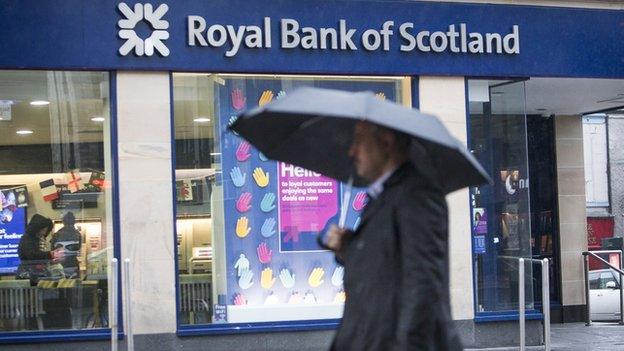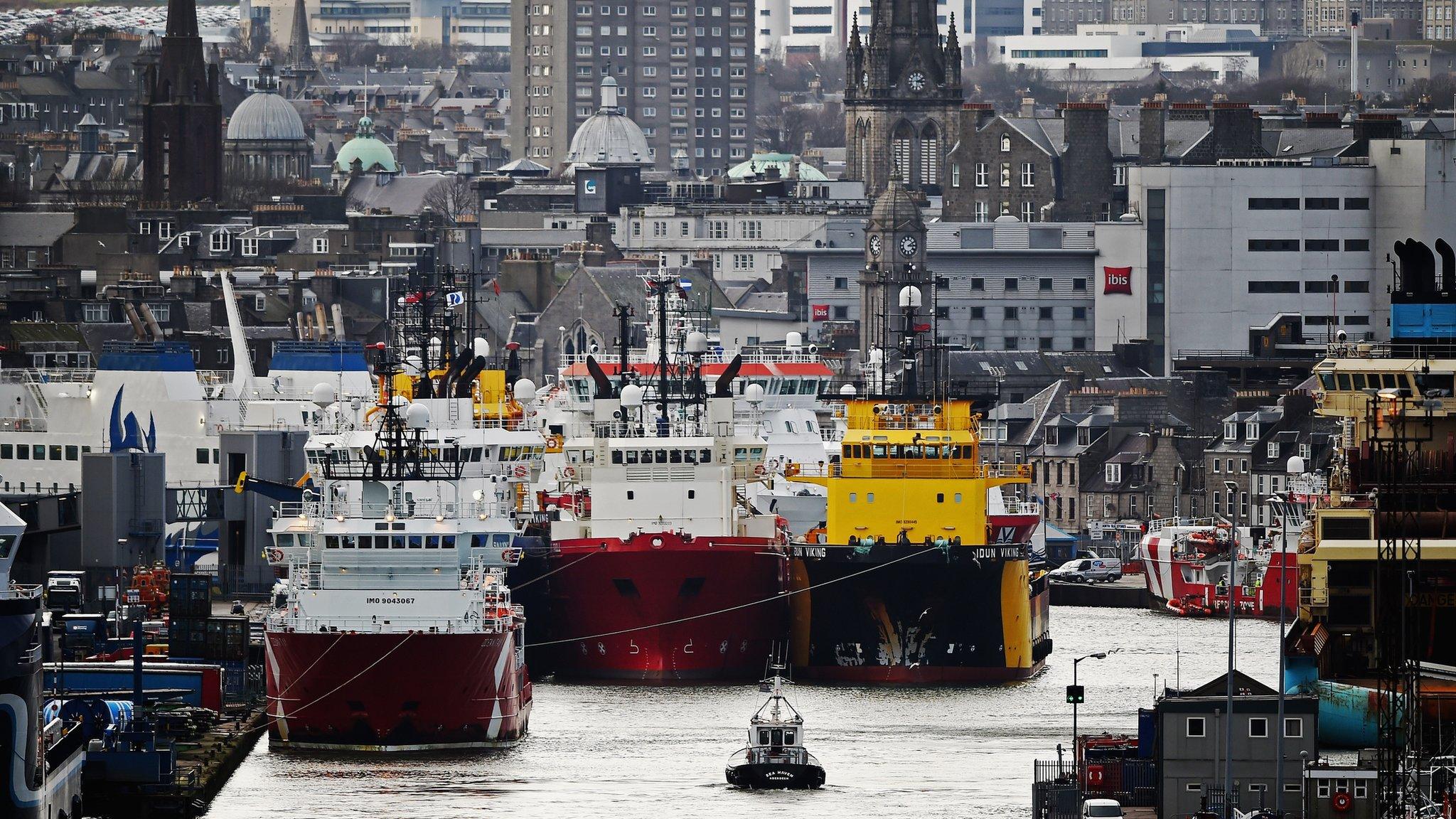RBS: Retreat and misdemeanours
- Published

Seven years of Fred Goodwin's plenty, followed by seven years of famine, or at least seven vast losses.
It has an Old Testament resonance to it, just as the Royal Bank of Scotland has been plagued by problems on a Biblical scale.
But unlike the story from the Book of Exodus, don't assume that the RBS famine years are over.
As the market has judged in the wake of its annual results publication (the share price down 4%) there's a lot more mess to be sorted out.
What's striking about Ross McEwan's approach is that the chief executive is upping the pace of taking that action, with an ever more radical approach to just how small he wants the Royal Bank to be.
Assume that he shares that ambition with his main shareholder, the UK Government.
Bank roles
It may be partly that impatience has taken over. But listening to Mr McEwan, it is also that he now judges the bank has the management capacity to make the scale of changes he has in mind.
He also seems willing to implement "significant" job losses, as he carves out out much of the Corporate and Investment Bank division. CIB now has 16,000 to 18,000 roles.
That's after taking the total payroll down from 119,000 at the end of 2013 to 109,000 at the start of this year. The staff pay bill was down last year by £480m to £6.4bn, at a restructuring cost for that alone of £409m.
Global footprint
The revised scaling-down plan will leave the CIB working with customers based in the UK and Ireland as well as western Europe, with outposts in the US and Singapore to serve UK and European clients.
This is a big part of the retreat from the global investment banking footprint that was the rationale for RBS growing so far and so fast, and buying ABN Amro's reach into Asia. It remains the business model for HSBC - everywhere's "local bank", including Zurich.
But now, RBS will be more like Lloyds Banking Group, with an overseas presence largely to service its core bank's clients based in its core market. It's happening already. Four-fifths of its revenue is now from its UK operations, up from 48% in 2008.
Having been in 51 countries, RBS has exited nearly half. And from 28 countries, it wants to slim down to a presence in only 13.
It hasn't been spelled out, but that slimming down process means less for headquarters to do. So while the retreat will hit jobs in India, and the investment bank operations in London, the Gogarburn HQ in Edinburgh is bound to be affected too.
Rigging markets
Although there will be an outpost in the US, a substantial part of the RBS turnaround is the off-loading of its Citizens Bank subsidiary, a big retail franchise in the States.
That should free up a lot of the capital base the bank requires to reach its target 13% capital buffer. And there's a promise, with today's results, that any surplus capital can be returned to investors. A reminder: that means you and me, for now.
Dividends on ordinary shares might even be contemplated in 2016, when Ross McEwan thinks the bank might be ready for the start of the sell-off of the taxpayers' 80% stake.
That has been waiting for the return to profit, to dividends and to the share price rising above the 455 pence level at which the UK Government breaks even on its £45bn investment. (It used to be break even at 500 pence, but that was before the Government took some large fees for providing insurance.)
The price has remained stubbornly short of the 400 pence level until one point earlier this week. And a doubt that investors will want to see resolved before the price rises much more is the large black cloud of misconduct and litigation.
Mis-selling of payment protection insurance has had another £650m set aside in RBS's 2014 accounts, bringing the total to £3.7bn. Mis-selling of interest rate hedging products to business customers is having a further £185m provided for redress (total £1.4bn).
There's the rigging of the foreign exchange market, for which £720m is being set aside for one year. In total, the money set aside in the 2014 for 'conduct and litigation' is a staggering £2.2bn.
Actually, it's less staggering, when you recall that the figure was £3.8bn last year.
See you out of court?
In litigation, there is dispute over responsibility for RBS's part in building the risky market in residential mortgage debt, as well as Fred Goodwin's £12bn rights issue in 2008 - less than six months before the bank collapsed. The legal question there is whether investors were knowingly misled by the bank, thus making it liable for their losses.
Now, I'm no expert in corporate litigation, least of all the American flavour, but it seems a fair bet that this could drag on, expensively, for decades.
So when Ross McEwan says that he thinks the bank could be in shape for a dividend and a start to the sell-off of the government's stake next year, could this be a hint that he wants to do a deal, and get the litigation out the way?
If so, it probably won't come cheap.
PS. Trust
An interesting diversion amid the massive amount of information that RBS puts out on its annual results day is its market research into customer perceptions. And it doesn't look good for the bank on its home turf.
It asks customers if they would recommend the bank to others. The negative 'detractors' are subtracted from positive 'promoters'. And we learn that English and Welsh customers of the NatWest-branded bank are more positive than negative. In Scotland, they were better in 2014 than the year before, but a lot more negative about recommending RBS to others than are NatWest customers south of the border. In Northern Ireland, they're much more negative still about the Ulster Bank division.
In business banking, everything is negative, but getting less so. Again, they are much more likely to be detractors in Scotland than in England and Wales.
The bank also asks its customers if they trust their bank to do the right thing, and subtracting the mistrusters from the trusters, NatWest customers have been much more trusting than mistrusting, and much more so than Scottish customers. Last year saw the Scottish figure pulled back from negative territory of 16% more distrusting than trusting in 2013.
And yet, through this, it seems customers have remained remarkably loyal.
- Published24 February 2015
